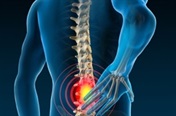
Generally speaking, if you have severe back pain that doesn’t improve with rest or which doesn’t subside within a week of home treatment, you should be checked out by a healthcare professional. If your back pain is due to a fall, an accident or a blow to the back, you should see a doctor immediately.
Also, if you have a medical condition that puts you at high risk for a spinal fracture, such as osteoporosis, you need to see a doctor immediately if you experience back pain. Your doctor will make sure that there’s no structural damage or conditions that require immediate treatment.
Sometimes back pain can point to a serious medical problem.
Red flags for back pain
If you have back pain and experience any of the red flags below, you should see a doctor as soon as possible:
- Bladder or bowel control problems (such as difficulty passing urine)
- Numbness in the groin or in the vicinity of the anal region
- Weakness, numbness or pins and needles in the legs
- Fever
- Rapid weight loss
- A history of cancer
- Abdominal pain
- Pain running down one or both legs
- Feeling unsteady on your feet
- Increased pain when lying down
- Pain that wakes you up at night
- Pain that’s unrelated to movement
- Pain that’s localised in the upper back (thoracic spine)
- A history of prolonged corticosteroid use
- A history of intravenous drug use
- A history of urinary tract infections (UTIs)
- In a child: any severe back pain that persists for more than three days
Questions to ask your doctor
The following questions will help you to make the most of your doctor’s visit:
- What is causing my back pain?
- What is the significance of my back pain? Is it a sign of ongoing damage?
- Are there any other symptoms I should look out for that could indicate a more serious condition?
- Are there activities I should start, continue or temporarily or permanently avoid to ease my back pain?
- Could my work (either my work station or manual work) be causing or contributing to my back pain?
- Should I get bed rest while my back hurts?
- What treatment options can I consider for my back pain?
- How long should I take medication or do special exercises for my back pain?
- Are there alternative therapies that I could consider?
- What can I do to prevent back pain from returning?
Yellow flags for back pain
Yellow flags are related to our beliefs about pain. They primarily have to do with our psychological response to the experience of pain – in other words, our fear of movement, our expectations in terms of the management of the problem, and our social behaviours and interactions. They include attitudes and beliefs, emotions, behaviours, and family and workplace factors.
If you experience any of the following, it’s important to discuss and address these problems with your doctor. These factors could play a key role in your rehabilitation and recovery:
- Continuous negative thoughts, where you believe back pain is dangerous or could be severely disabling
- Avoiding certain movements, reducing your activity levels, or not exercising due to fear of causing further damage
- Expecting that passive treatment like medication, massage or surgery, rather than active treatment, will be beneficial
- Feelings of depression, low morale or anxiety, and social withdrawal
- Social or financial problems
- Unsupportive work environment and/or overprotective or critical partner
- Use of extended rest
- Anxiety about heightened body sensations
- Impaired sleep
- Believing that pain is uncontrollable
- Misinterpreting physical symptoms
- An increased intake of alcohol or other substances since the pain started
- Yellow flags are often difficult to identify and manage. Seeking help may assist you in addressing these factors more readily.
Watch ‘The Hardest Pill to Swallow’, a TEDx Talk by Dr Tracy Jackson.
Chronic back pain, depression and suicide
Research by Mayo Clinic Proceedings shows that there’s a link between chronic pain (including back pain), and depression or “low mood” and suicide, but that doctors often miss this link because they primarily focus on physical pain. There also exists a risk of increased anxiety and substance abuse in people who suffer from chronic back pain.
If you have chronic back pain, you may benefit from checking in with a psychologist or psychiatrist, especially if you:
- Have a history of depression, anxiety or previous suicide attempts
- Have a history of alcohol and/or substance abuse
- Tend to be impulsive or aggressive
- Have experienced loss (e.g. work, family or social roles)
- Are resistant to seeking help for fear of stigma
- Have a family history of suicide
- Are not functioning as you should
Read more about why backache can be deadly.
Reviewed by general practitioners Dr Lienka Botha and Dr Suzette Oelofse, FX Health. April 201




 Publications
Publications
 Partners
Partners
















